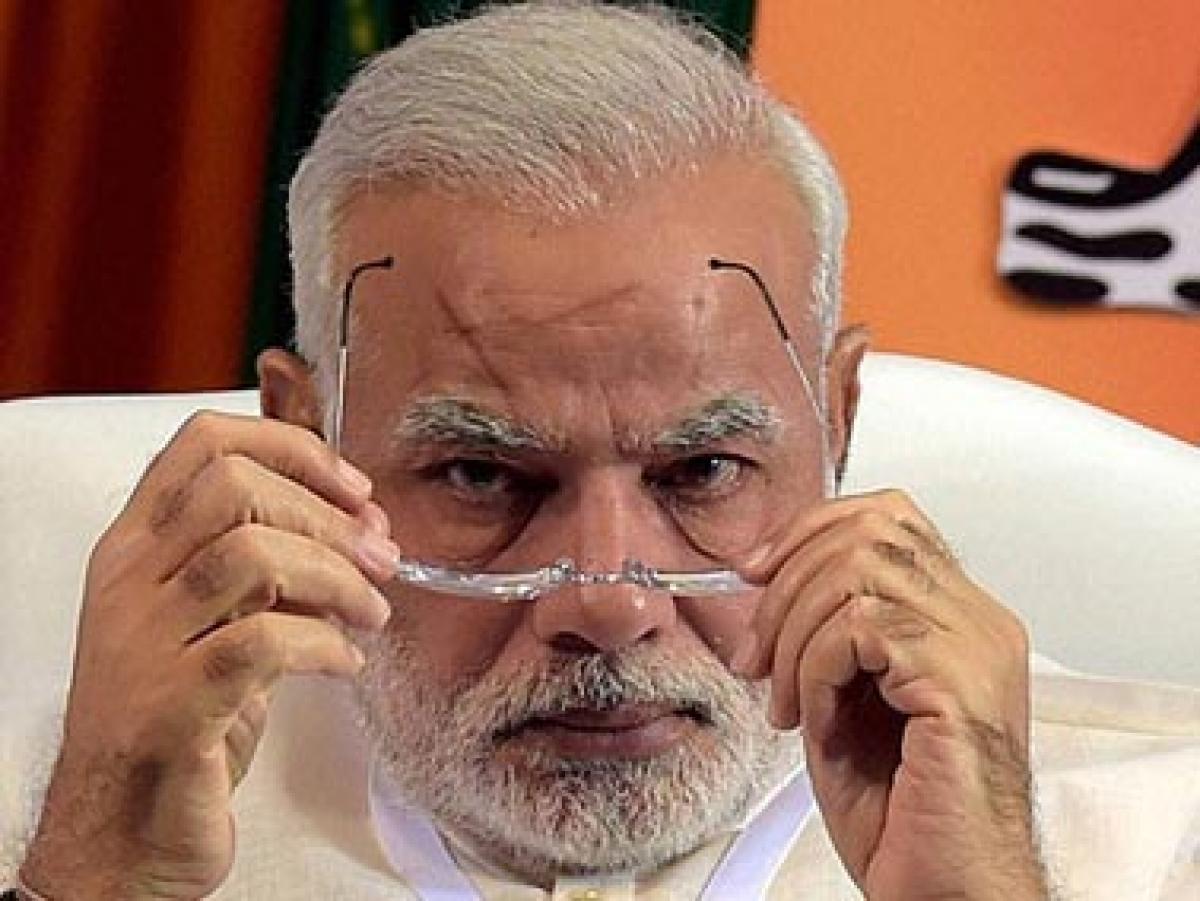Live
- Odisha move to prepare maritime perspective plan
- Jal Jeevan Mission empowering women in rural areas: PM Modi
- Pradhan urges Nadda to set up pharmacy unit in Odisha
- Assembly winter session ends ahead of schedule
- Nepali Army Chief General Ashok Raj Sigdel Strengthens Ties With India In Four-Day Visit
- BRS MLAs, MLCs Skip Second Day of Orientation Classes
- Andhra Pradesh Student Dies in Tragic Car Crash in Leicestershire, 4 Others Injured
- Oppn assails delinking of Waltair div from ECoR
- Rahul Gandhi Vs. Nirmala Sitharaman: War Of Words Over Public Sector Banks
- Rajinikanth’s Birthday: Aamir Khan, Upendra Joins ‘Coolie’ Shoot
Just In

Separately, speaking at the first ‘Transforming India’ Lecture organised by the NITI Aayog, the PM outlined his vision for economic development through rapid transformation, not incremental progress.A metamorphosis is needed,” the PM said. Ambitious, one must say, is Modi, who has a hard task manger’s approach to the development agenda.
Prime Minister Narendra Modi struck the right note when he asked his colleagues to focus on the implementation of the already taken decisions by the government at a meeting with the council of ministers.
Separately, speaking at the first ‘Transforming India’ Lecture organised by the NITI Aayog, the PM outlined his vision for economic development through rapid transformation, not incremental progress.A metamorphosis is needed,” the PM said. Ambitious, one must say, is Modi, who has a hard task manger’s approach to the development agenda.
After the meeting with ministers, he asked them to do follow-up meetings to ensure implementation of what has been discussed. In fact, this isn’t the first time PM Modi shows his urgency on the implementation-front. Two months back, the PM had done a review meeting of his various ministries.
The sense of urgency being shown on the implementation of decisions taken and schemes announced is very much warranted as his government enters the crucial third year of its term. Especially, when it comes to repairing the sick economy, there isn’t much time left since the last year of the government is typically busy in planning general elections. Even the next year is a busy year as crucial state polls are due.
The passage of Goods and Services Tax (GST) is a major step to make investment climate positive. But, as Firstpost highlighted earlier, two key areas — land and labor reforms — remain two major bottlenecks for the companies that wish to set up factories in India.
This is something Singapore deputy PM, Tharman Shanmugaratnam, highlighted in the NITI Aayog lecture, who said key challenges for investments in India lies in hurdles in land and labour areas, especially in the context of Make in India.
This is something experts too have argued in the past. After Modi let the land Bill lapse in August 2015 following protests from trade unions and farmer bodies, the Centre has largely let the issue of land acquisition to states. But, that isn’t enough. The Centre has to make sure easier land acquisition happen by reintroducing the land Bill when numbers turn favourable in the Upper House or pushing states separately.
Similarly, revamping archaic labor laws too is a big challenge, where the NDA government hasn’t made much progress yet. Modi, who endorsed labour reforms in his earlier avatar as Gujarat Chief Minister, hasn’t managed to overhaul the complex labor laws.
Almost two-thirds of Indian workers aren’t protected by any laws and are outside the organised structure.
The Modi government has to address the issue to deal with the emerging workforce and improve ease of doing business negotiating with the country’s powerful trade unions, including the right wing unions.
Labour laws in India are mostly archaic,” said Anshul Prakash, associate partner at Khaitan & Co. in August to Firstpost. In fact, there are some signs of early revival in the investment intentions of companies in the first half of this year.
A report recently released by Care rating agency, which cited government data, suggested that investment intention has seen slight uptick during the first half of calendar 2016 with number of investment proposals increasing both in terms of value and number of proposals.
But, it is too early to conclude that investment cycle has turned the corner, the agency noted. The report also noted that dropped projects in the January-June period in 2016 were lower at Rs 5.21 lakh crore as against Rs 7.05 lakh crore during the same period last calendar, citing data from Centre for Monitoring Indian Economy (CMIE).
This is another encouraging sign. With GST happening and banking sector reforms too underway, a major push from the central government on the implementation part could help continue with the early momentum seen in investment revival, according to economists.
In this context, PM Modi’s efforts to sensitise his ministers on the implementation part by following up on decisions taken already make immense sense. (This article was first published at http://www.firstpost.com. Reprinted with their permission)

© 2024 Hyderabad Media House Limited/The Hans India. All rights reserved. Powered by hocalwire.com







